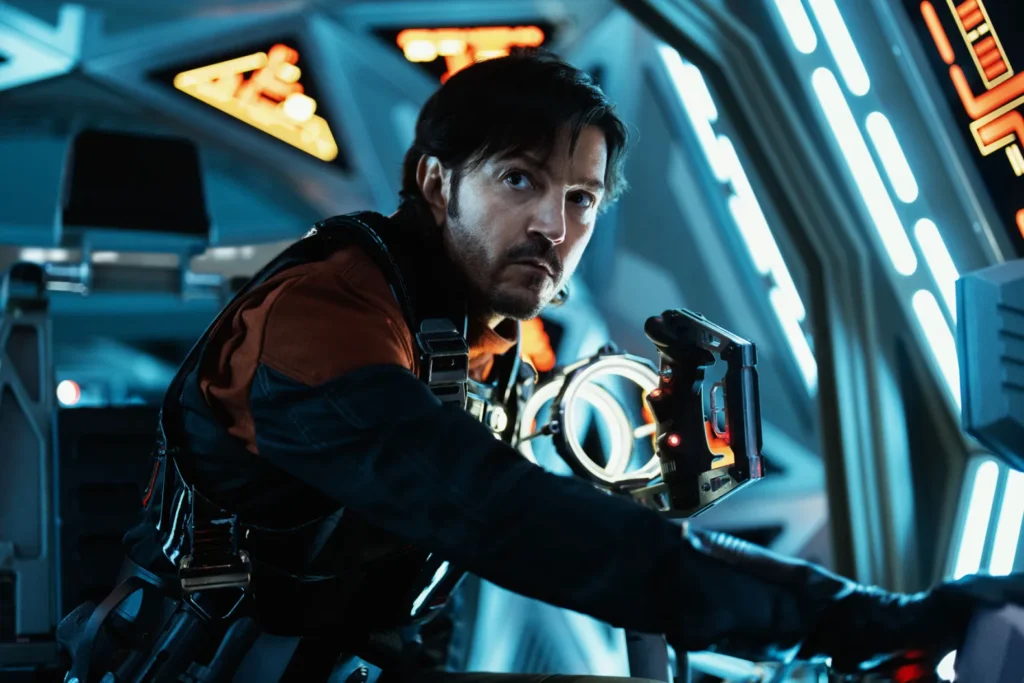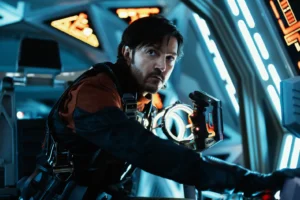
Early in the second season of Andor, an Imperial officer considers a situation where he could arrest someone for being an undocumented immigrant, or use the threat of arrest to make that person do his bidding. Reveling in the power he has at the moment, he says, “The situation requires… nuance.”
He’s a despicable fascist predator, but he’s right about the nuance part. Andor, returning to Disney+ two-and-a-half years since we last saw it, is a seeming pop-culture paradox: a Star Wars story that requires nuance. There are great Star Wars projects and terrible Star Wars projects, but even the best ones, like Empire Strikes Back, are framed in relative black-and-white morality, designed to evoke the kid-friendly pulp and adventure stories that George Lucas loved so much as a child. The Last Jedi is among the more thematically complex of the films, and even there, Laura Dern couldn’t stop herself from mouthing “pew pew” whenever her character fired a blaster. It’s a franchise built on straightforward spectacle and bombast, as concerned with selling toys as telling stories.

There aren’t a lot of Andor toys on the market. Presented as a prequel to Rogue One, it pushed that movie’s relatively gray morality into even more ambiguous places. Though the series was named for Cassian Andor, the Rebel operative played by Diego Luna in the film, it was really about how rebellions are born, and the enormous compromises and sacrifices required to make them work. After a while, Cassian’s gradual evolution from self-interested mercenary to true believer was overshadowed by the choices being made by other characters, especially Mon Mothma (Genevieve O’Reilly), a politician by day and Rebel dealmaker by night; and Luthen Rael (Stellan Skarsgård), a ruthless spymaster with no illusions about what he, Mon, Cassian, and everyone else will have to do to overthrow the Empire. In the first season’s signature moment, Luthen tells one of his assets, “I’m condemned to use the tools of my enemy to defeat them. I burn my decency for someone else’s future. I burn my life to make a sunrise that I know I’ll never see.”

Andor creator Tony Gilroy at one point intended to spend five seasons chronicling Cassian’s life in the years leading up to the events of Rogue One and the first Star Wars film. More recently, he has said that he realized it would take far too long to make that many seasons, and that Luna would look too old by the time they finished, relative to the first time he played Cassian. So instead, Gilroy has squeezed four years’ worth of ideas into this second and final 12-episode season. Like the first, it’s structured as a quartet of three-episode stories, and Disney is even releasing it this way, dropping three installments per week for the next month.
The compression of all these events — which are meant to play out across four years in the lives of Cassian, Mon, Luthen, and their enemies and allies — proves a mixed blessing for Andor Season Two. The first season could be sluggish at times, especially in its opening arc (which was much more centered on Cassian than on the supporting characters who soon outshone him), where nearly all of this new season moves at a relentless pace(*). But there are also times when the show has to make too much haste to get from one plot point to the next, particularly in the concluding arc, which brings us right up to the beginning of Rogue One.
(*) There’s still some meandering in the first trio of episodes, with one subplot going into much more detail than you would expect about the destination wedding of Mon Mothma’s daughter (like a cross between The White Lotus and the final season of How I Met Your Mother), and another with Cassian stranded on a planet while his friends are in trouble elsewhere. Mostly, though, things are lean and mean.

Some of the character arcs work smashingly well presented this way. As the rebellion begins to resemble the organized fighting unit from the original film trilogy, rather than the network of spy cells Luthen was running in the first season, he and his assistant Kleya (Elizabeth Dulau) begin to find themselves increasingly at odds with the more noble-minded rebels like Mon. When Luthen implies that they will have to murder a former ally whose behavior has become erratic, Mon admits, “I’m not sure what you’re saying.” “How nice for you,” Luthen replies, with equal parts condescension and envy.
There’s also a fantastic subplot involving Syril Karn (Kyle Soller). In Season One, he was essentially the Imperial equivalent of a mall cop, whose obsession with Cassian eventually brought him to the attention of Imperial Security Bureau officer Dedra Meero (Denise Gough). In the new season, Dedra is assigned by Rogue One villain Orson Krennic (Ben Mendelsohn) to turn public sentiment against the citizens of Ghorman, a planet the Empire needs to ruthlessly strip mine, and she sends Syril to infiltrate the Ghorman underground. Syril was in some ways the first season’s most impressive creation: a figure who was simultaneously ridiculous, pathetic, contemptible, and oddly sympathetic(*). As the Ghorman situation grows uglier and uglier, Soller and the Andor creative team take Syril to even more tragic places.